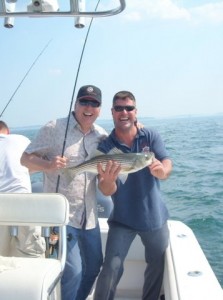
Leslie “Catch a Falling Star” Brenner reviews Preston’s this week. She makes some good points about the restaurant promoting such dishes as onion rings as “superfood” for its “antioxidants, fiber and/or vitamins [that] are especially health promoting and disease-preventing.” (That is the stupidest idea for a restaurant since We Oui.)
Silly gimmicks on Preston’s menu aside, La Brener, the newest “skinny bitch” in town, goes on to put her tiny foot in her big mouth. She makes a sweeping statement about farm-raised Atlantic salmon being bad and backs it up with a 5-year old study. Hear her roar:
“But it’s either disingenuous or naive to trumpet the health benefits of farmed Atlantic salmon, which Preston’s also gives an S. Yes, there are health-promoting omega-3 fatty acids in all salmon. But a widely publicized 2005 Cornell University study concluded that “consumption of farmed Atlantic salmon may pose health risks that detract from the beneficial effects of fish consumption.” That’s because farmed salmon bio-accumulate contaminants including “PCBs, dioxins, toxaphene, and dieldrin, which have been associated with a variety of cancer and noncancer health effects, the latter including adverse neurobehavioral and immune effects.”
Not so fast, missy. Some of the best farm-raised salmon in the world comes from the Bay of Fundy in the North Atlantic. The fish are caged in low density pens and occupy about 3% of the volume of the pens (one of the lowest in the world) so they swim freely while at the same time lessening environmental impact. They are raised using a three bay growing system where one is used for smolts, the second for grow-out, and the third left out of production so the bottom recovers naturally. The fish are fed a diet high in both protein and fat and the feed is only about 20% fish with the balance being primarily vegetable proteins. Salmon cages are placed in areas with high water flow so the fish are constantly swimming, getting the exercise that develops the muscular fish that give the optimal eating quality.
How do I know all of this? I graduated from Steve Connolly Seafood “Seafood School for Chefs” last summer. And I don’t want people (or chefs!) in Dallas to read “farm-raised” on a menu and assume it is bad. Ask your server or chef where the product comes from before you make a decision. If the chef doesn’t know, order pasta.
Update: I just spoke with a marine biologist. He told me news stories slamming farm-raised salmon appear almost every year around this time. Why? Because it’s time for wild salmon to hit the market. The folks in the salmon business in Alaska are Slick Willy’s. Why not take aim at the competition—farm-raised is certainly less expensive.
“Biologists are starving,” he says. “They will whore themselves out for grant money and will guide their research in any direction to get future grants.” He was familiar with the study sited by Brenner. “She drank the Kool-Aid,” he said. “If someone is looking for faults, there is plenty of funding to find them.” I love Kool-Aid. Cherry. With vodka.





